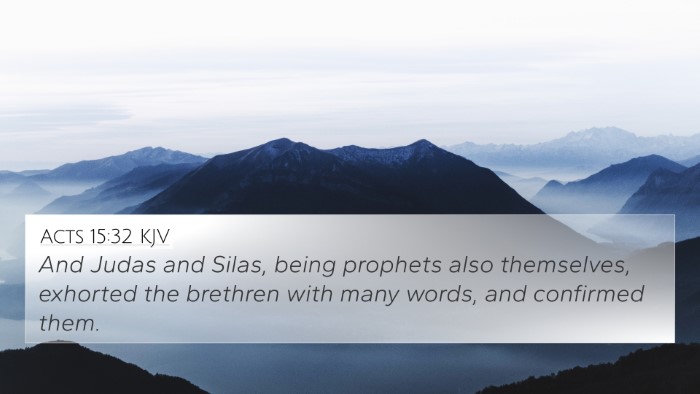Understanding Acts 15:27
Acts 15:27 states: "We have therefore sent Judas and Silas, who will also tell you the same things by mouth." This verse is a part of the broader narrative in the book of Acts that addresses the early church's challenges, particularly regarding the inclusion of Gentile believers and the necessity of the law. In this context, the church leaders convened to discuss these issues, which laid the foundation for some fundamental doctrines in Christianity.
Contextual Background
The Jerusalem Council is a pivotal moment in the Book of Acts. The apostles and elders gathered to address the growing number of Gentile converts and whether they should be required to follow Jewish law. The conclusion was that salvation comes through grace and faith in Jesus Christ, not strict adherence to the law. Acts 15:27 serves as a confirmation of this decision, showing that the church leaders were serious about communicating their findings and ensuring unity within the body of Christ.
Insights from Public Domain Commentaries
Matthew Henry's Commentary
Matthew Henry emphasizes that the decision of the council was wise and timely, as it acknowledged the diversity within the church while maintaining the core truths of the gospel. He points out that sending Judas and Silas as representatives demonstrates the church's commitment to unity and the importance of clear communication regarding doctrinal matters.
Albert Barnes' Notes on the Bible
Albert Barnes focuses on the authenticity and authority that Judas and Silas bring to the message. He suggests that their presence underscores the legitimacy of the council’s decision and provides reassurance to the church in Antioch. Their message was not only for the benefit of the Gentiles but also served to strengthen the existing Jewish believers by clarifying the path of salvation.
Adam Clarke's Commentary
Adam Clarke adds the significance of the oral tradition in early Christianity. He indicates that the spoken message from trustworthy leaders was essential in reinforcing the written letter sent to the believers. This dual approach ensured that misunderstandings could be clarified and that the community could embrace the message of grace together.
Cross-References for Acts 15:27
- Colossians 3:14 - Explains the importance of unity among believers.
- Galatians 2:1-10 - Details the events surrounding the Jerusalem Council.
- Matthew 18:16 - Mentions the principle of establishing truth through witnesses.
- John 17:21 - Jesus’ prayer for unity among His followers.
- Acts 15:22 - Discusses the decision to send representatives to convey the council's message.
- Acts 15:23 - The letter issued by the apostles to the Gentile believers.
- 2 Corinthians 1:24 - Encourages the church to stand firm in faith, reflecting unity in the message of Christ.
- Romans 15:5-7 - Calls for harmony and acceptance among believers of diverse backgrounds.
- Philippians 1:27 - Promotes conduct in a manner worthy of the gospel, fostering unity.
- Ephesians 4:3 - Encourages believers to work diligently towards unity in the Spirit.
Connections with Other Biblical Themes
Acts 15:27 not only speaks to the immediate context of the Jerusalem Council but also weaves into several broader biblical themes. The emphasis on unity and clear communication resonates throughout the scriptures, from the teachings of Jesus to the writings of the apostles. Moreover, it highlights the church’s collective responsibility to uphold the truth of the gospel amidst diverse understandings.
Unity in Diversity
This verse highlights the concept of unity in diversity, where various cultural and religious backgrounds converge under the truth of grace through faith. As believers, understanding that we can differ in practices but unite in purpose serves as a guiding principle in the church today.
Importance of Leadership and Authority
The role of leaders in communicating doctrine is crucial. The council’s decision, confirmed by credible leaders such as Judas and Silas, teaches modern readers about the necessity of sound leadership within the church to guide and protect the faith community from false teachings.
Application for Today
For contemporary believers, Acts 15:27 serves as a reminder of the importance of church unity, clear communication of God’s word, and the pivotal role of our leaders. As we grapple with various interpretations of scripture today, emulating the approach of the early church in maintaining doctrinal purity and communal harmony is essential.
Conclusion
In summary, Acts 15:27 encapsulates a moment of clarity, unity, and leadership in the early church. The flow of communication through recognized leaders like Judas and Silas underscores the commitment to the gospel's truth and the need for believers to support one another in their spiritual journeys. Through cross-referencing with other texts, we can expand our understanding of the implications of this verse and apply its lessons in our own contexts.






